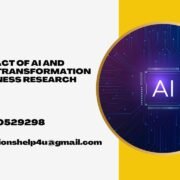The Impact of AI and Digital Transformation on Business Research
The Impact of AI and Digital Transformation on Business Research
Introduction
The Impact of AI and Digital Transformation on Business Research. In the ever-evolving business landscape, Artificial Intelligence (AI) and Digital Transformation are reshaping the way research is conducted and utilized. Companies are leveraging AI-driven insights to make data-driven decisions, while digital transformation enhances operational efficiency. As businesses embrace these technological advancements, the impact on research methodologies, decision-making, and competitive strategies becomes more profound.
The Role of AI in Business Research
1. AI-Driven Data Analysis
AI-powered tools can analyze vast amounts of data with unparalleled speed and accuracy. Traditional research methods relied on manual data collection and analysis, which was time-consuming and prone to errors. AI algorithms, however, can process large datasets, identify patterns, and generate insights within seconds.
2. Predictive Analytics for Strategic Decision-Making
One of the most significant contributions of AI to business research is predictive analytics. Machine learning models assess historical data to predict future trends, enabling businesses to stay ahead of the competition. Companies use AI-driven predictive models to forecast market demand, customer behavior, and financial risks.
3. Enhanced Market Research Capabilities
AI enhances market research by providing real-time insights into consumer preferences, emerging trends, and competitor strategies. Businesses no longer rely solely on surveys and focus groups; instead, they use AI tools to analyze social media sentiment, track online reviews, and monitor search engine trends.
4. Automation of Repetitive Tasks
AI significantly reduces the workload of researchers by automating repetitive tasks such as data collection, content analysis, and reporting. This allows professionals to focus on high-value strategic activities, ensuring that business decisions are based on comprehensive research rather than routine tasks.
The Impact of Digital Transformation on Business Research
1. Cloud Computing and Big Data
Digital transformation has led to the adoption of cloud computing and big data technologies, enabling businesses to store and analyze massive datasets efficiently. Cloud-based research tools provide seamless collaboration, allowing teams across different locations to access and process data in real time.
2. Improved Data Accessibility and Integration
With digital transformation, businesses have unprecedented access to structured and unstructured data from various sources. Integration of AI with digital platforms allows companies to gather data from social media, online transactions, and IoT devices, ensuring that research is based on diverse and dynamic datasets.
3. Real-Time Data Processing
Businesses now operate in a fast-paced environment where real-time data processing is essential for making informed decisions. Digital transformation enables companies to analyze customer interactions, track website performance, and optimize marketing strategies instantaneously.
4. Enhanced Customer Insights
Customer behavior is at the core of business research, and digital transformation provides advanced tools to understand it better. Businesses can leverage AI-powered customer analytics, chatbots, and CRM systems to gain deeper insights into consumer preferences, thereby enabling hyper-personalized marketing strategies.
AI and Digital Transformation in Competitive Intelligence
1. AI-Powered Competitive Analysis
AI tools help businesses monitor competitors by analyzing their online presence, pricing strategies, and customer sentiment. Companies can gain an edge by using AI to extract insights from competitors’ website traffic, social media engagement, and advertising strategies.
2. Automated Benchmarking Tools
Benchmarking is essential for assessing performance against industry standards. Digital transformation has led to the development of automated benchmarking tools that compare key performance indicators (KPIs) across businesses, helping companies identify areas for improvement.
3. AI-Driven Sentiment Analysis
Sentiment analysis, powered by natural language processing (NLP), enables businesses to understand public perception of their brand and competitors. AI can analyze millions of customer reviews, social media posts, and news articles to gauge market sentiment and adjust strategies accordingly.
Challenges and Ethical Considerations
1. Data Privacy and Security Risks
With the increasing use of AI and digital tools, data privacy concerns have emerged. Businesses must ensure compliance with regulations such as GDPR and CCPA to protect consumer data while maintaining ethical AI practices.
2. Bias in AI Algorithms
AI models can sometimes reflect biases present in training data, leading to inaccurate research conclusions. Organizations need to implement bias detection and mitigation strategies to ensure fairness in AI-driven business research.
3. High Implementation Costs
While AI and digital transformation offer significant benefits, the initial investment and infrastructure requirements can be costly. Small and medium-sized enterprises (SMEs) may face challenges in adopting these technologies without proper financial planning.
The Future of Business Research with AI and Digital Transformation
1. AI-Driven Decision Intelligence
The future of business research lies in decision intelligence, where AI goes beyond analysis and provides actionable recommendations. Businesses will rely on AI to automate decision-making processes and optimize strategies dynamically.
2. AI-Powered Research Assistants
The next generation of AI tools will act as virtual research assistants, conducting literature reviews, summarizing reports, and suggesting relevant sources. This will further enhance productivity and innovation in business research.
3. Integration of Blockchain for Data Transparency
Blockchain technology is expected to play a vital role in ensuring data integrity and transparency in business research. Companies can use blockchain to create tamper-proof records of research findings, fostering trust and credibility.
4. Advanced AI-Generated Insights
AI will evolve to provide more sophisticated insights by combining multiple data sources, detecting subtle correlations, and identifying emerging business opportunities that would otherwise go unnoticed.
Conclusion
AI and digital transformation are revolutionizing business research, enabling companies to make data-driven, strategic decisions with unparalleled accuracy. From predictive analytics to automated data processing, the impact of these technologies is reshaping research methodologies and business strategies. While challenges such as data privacy and AI bias must be addressed, the potential benefits far outweigh the risks. As we move forward, businesses that embrace AI and digital transformation will gain a significant competitive advantage in the market.
Thank you for read our blog “The Impact of AI and Digital Transformation on Business Research”.
I hope this blog is helpful to you, if you have any question feel free Call / WhatsApp: +91.9830529298 || Email: dissertationshelp4u@gmail.com.
Also read our more BLOG here.





